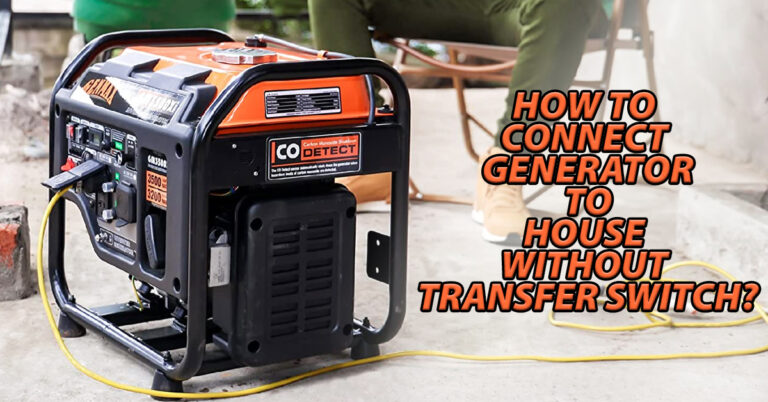How Much Does A Generator Weigh?
A generator is a device that converts mechanical energy into electrical energy. It is a practical piece of machinery that might serve as a significant energy source during a power outage or in areas without access to the grid. The generator’s weight is a crucial factor to take into account since it will affect how easily you can carry it and where you may use it. The weight may vary greatly depending on the size and type of generator you are considering. Smaller portable generators may weigh as little as 30 pounds, in contrast to larger permanent generators that may weigh several thousand pounds. A generator’s weight may vary from 30 pounds to several thousand pounds, depending on its size and intended use.
The part below will provide you with a more detailed response to your question about the weight of various generator kinds. The most popular generators with weight are shown here. Consider this:
| Generator | Generator Weight |
|---|---|
| Champion 75537i | 94.8 lbs |
| Honda EU2200i | 47 lbs |
| Honda EU3000iS | 130.7 lbs |
| Westinghouse Wgen7500 | 200.6 lbs |
| Yamaha EF2000iSv2 | 44.1 lbs |
| Generac IQ2000 | 46.5 lbs |
| DuroMax XP4850EH | 122 lbs |
| DuroMax Hybrid XP12000EH | 224 lbs |
| Wen 56200i | 48 lbs |
| Champion 3400 Dual Fuel | 95.7 lbs |
How Much Does A Generator Weigh?
Generators are useful devices that create electricity, either as a primary power source in isolated places or as a backup power supply during crises. They come in a variety of sizes and forms, and each one has unique traits and abilities. Weight is an important factor to take into account when choosing a generator since it may affect mobility and usage. In order to learn more about various generator kinds and how they work, read the section below:
Portable Generator
Compact and lightweight, portable generators are designed to be transported conveniently. They are ideal for use as a backup power source for residences, businesses, outdoor events, and camping. Weights for smaller, portable generators size may be as low as 20 pounds and as high as 200 pounds for larger, more powerful versions.
Inverter Generators
Inverter generators are intended to provide cleaner, more reliable energy, much like portable generators. They are often used for fragile electronics like computers and phones and are popular for camping and leisure purposes. Inverter generators typically weigh between 50 and 150 pounds, depending on the size and power output of the device.
Standby Generator
Residential and business establishments use standby generators as backup power sources since they are stationary equipment. They are often heavier and more powerful than portable generators, weighing anywhere from 250 to over 1,000 pounds. Standby generators, which are often fueled by natural gas or propane, will start up right away and start supplying energy in the event of a power outage.
Industrial Generator
Industrial generators are enormous, powerful devices used in settings like factories or construction sites. They are both permanent and portable, and they are capable of producing a significant quantity of power. Industrial generators may weigh anything from 500 to over 10,000 pounds, depending on the size and capacity of the device.
Overall, the type, size, and power output of a generator all have an impact on its weight. Portable generators are often the lightest; standby and industrial generators are sometimes somewhat heavier. It is important to consider a generator’s weight when choosing one since it may affect how portable and user-friendly it is.
Factors That Affect Generator Weight?
Type Of Generator
The type of generator has a significant impact on its weight. Compared to regular standby or industrial generators, portable inverter generators are more frequently portable and lighter. In general, backup generators are larger and more powerful, and they are erected permanently in one location. Industrial generators, which are utilized in industrial settings like factories and construction sites, are the largest and heaviest generators.
Size And Power Output
The size and power output of a generator both affect its weight. Generators that are bigger and more potent tend to weigh more than their smaller, weaker equivalents.
Fuel Type
A generator’s weight may vary depending on the fuel it runs on. Portable generators typically use gasoline, although backup generators may operate on natural gas or propane. Commercial generators may run on diesel or other types of fuel. Since diesel and gasoline are often lighter than each other, a generator running on these fuels may be overall lighter.
Building And Materials
The materials used in a generator’s construction may also have an impact on its weight. Generators constructed of heavy-duty materials like metal and steel sometimes weigh more than those made of plastic or other lightweight materials.
Features And Accessories
A generator may be heavy if it has a lot of features and extras, such as many outlets, digital displays, or built-in wheels. These additional features and accessories might make the item heavier overall.
Fuel Tank Size
The size of a generator’s fuel tank may affect how much it weighs. With bigger fuel tanks, the device’s weight may rise, while falling with smaller fuel tanks.
Battery size
Some generators come with a battery that may be used to start the machine. Depending on the size and kind of battery, the device’s weight may change.
Controls And Switches
Switches and controls for a generator could also be bulky. Generators with more buttons and switches might be heavier than ones with fewer controls.
Sound Volume
Since heavier sound-dampening materials may be employed to make generators with lower noise levels, a generator’s weight may vary depending on its noise level.
Since heavier sound-dampening materials may be employed to make generators quieter, a generator’s weight may vary depending on its noise level.
Design And Brand
In terms of brands and kinds, generator weight might vary greatly. Some brands and models could include features or components that are lightweight and add to their overall lightness.
Does Weight Matter In A Generator?
The weight of a generator is an important consideration since it may have an impact on its mobility and usage. Lighter generators are often easier to handle and carry if you need to move the generator between locations. Larger generators, however, could be more stable and less prone to tipping over, which would be essential in certain situations.
The weight of a generator can not always be as important as other factors like power output or fuel type. If you need a generator for emergency backup power at home, for example, a bigger unit that is permanently installed would be more appropriate than a smaller, transportable type.
Generally speaking, a generator’s weight may be a crucial factor, but it is not the only one. When choosing a generator to meet your specific needs and goals, take into account factors like power output, fuel type, size, and other factors.
Choosing The Correct Generator Size For Your Needs
When choosing a generator, it’s important to consider its size, weight, power output, and other factors. To choose the generator size that best meets your needs, you may follow these steps:
Determine Your Electricity Needs
The first step in choosing the correct generator size is determining how much power you will need. Make a list of the devices and appliances you want to run off the generator, then calculate the total wattage of those items. This might assist you in choosing the generator’s size and output power.
Consider The Weight Of The Generator
The weight of the generator is an important consideration if you want to transport it often. Even though they could produce less power, lightweight generators are often easier to handle and move. Although bigger generators could be more powerful and stable, moving them might be more challenging.
Consider The Fuel Type
The fuel type a generator utilizes may have an influence on its weight and mobility. Portable generators typically use gasoline, although backup generators may operate on natural gas or propane. Commercial generators may run on diesel or other types of fuel. Since diesel and gasoline are often lighter than each other, a generator running on these fuels may be overall lighter.
Consider The Features And Extras
A generator may be heavy if it has a lot of features and extras, such as many outlets, digital displays, or built-in wheels. These additional features and accessories might make the item heavier overall.
Read Reviews And Compare Models
As soon as you are certain of the size and power output you want, look at a variety of types and brands. Read reviews and compare the features and specifications of several models to find the one that best meets your needs.
FAQs
-
How Much Does A Portable Generator Weigh?
Portable generators may weigh anything from 20 pounds for a small, handheld unit to over 200 pounds, depending on their size and capacity. The weight of a portable generator is determined by its size and power output.
-
How Much Does An Inverter Generator Weigh?
An inverter generator typically weighs between 50 and 150 pounds, depending on its size and capability. Inverter generators are intended to provide cleaner, more reliable energy, much like portable generators.
-
How Much Does A Standby Generator Weigh?
Standby generators are larger and more powerful than portable generators, weighing anything from 250 to over 1,000 pounds. Natural gas or propane is the typical fuel source for standby generators, which are permanently installed equipment used as a backup power supply for households and businesses.
-
How Much Does An Industrial Generator Weigh?
Industrial generators are the largest and heaviest kind of generator, weighing anywhere from 500 to over 10,000 pounds, depending on the size and capabilities of the generator. Industrial locations, such as factories and construction sites, use permanent or portable industrial generators.
-
What factors Affect The Weight Of A Generator?
The weight of a generator is affected by its kind, size, power output, fuel type, materials and construction, features and accessories, and other factors. In general, industrial or backup generators are heavier than portable ones, and bigger, more powerful generators weigh more than smaller, less powerful ones. The kind of fuel utilized and the materials used in the building of a generator may also have an impact on its weight.
-
Is It Important To Consider The Weight Of A Generator?
The weight of a generator is an important consideration since it may have an impact on its mobility and usage. Even though they could produce less power, lightweight generators are often easier to handle and move. Although bigger generators could be more powerful and stable, moving them might be more challenging.
-
How Can I Choose The Generator Size That Best Suits My Needs?
To choose the best generator size for your needs, first determine your power requirements. Make a list of the devices and appliances you want to run off the generator, then calculate the total wattage of those items. This might assist you in choosing the generator’s size and output power. Consider the weight, fuel type, features, and extras of the generator. Read reviews and compare numerous models and manufacturers to find the brand or model that best meets your needs.







